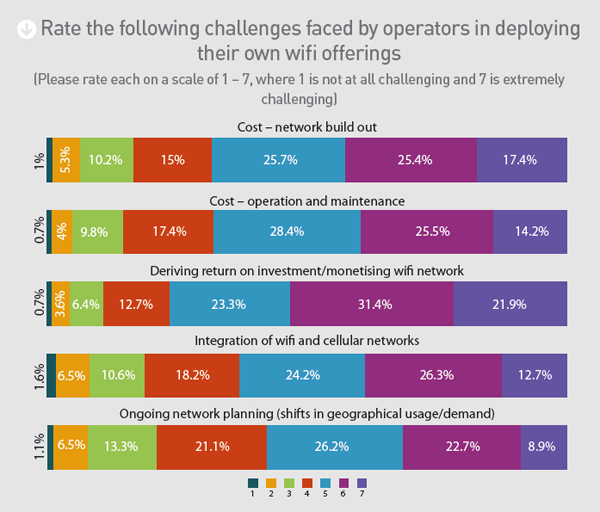RoI greatest challenge to operator wifi, says survey
Despite the range of recognised benefits available to mobile operators through wifi provisioning, there are clear concerns that the economics might not stack up. When respondents to the Telecoms.com Intelligence Industry Survey 2014 were asked to rank challenges that operators might face in deploying their own wifi networks, return on investment was considered as the most serious obstacle by far. A total of 53.3 per cent of respondents ranked RoI six or seven out of seven in terms of seriousness (with seven being the most serious), with that number rising to almost 57 per cent among operators.
March 12, 2014

Despite the range of recognised benefits available to mobile operators through wifi provisioning, there are clear concerns that the economics might not stack up. When respondents to the Telecoms.com Intelligence Industry Survey 2014 were asked to rank challenges that operators might face in deploying their own wifi networks, return on investment was considered as the most serious obstacle by far. A total of 53.3 per cent of respondents ranked RoI six or seven out of seven in terms of seriousness (with seven being the most serious), with that number rising to almost 57 per cent among operators.
The cost of deployment was some way further back, given the same ranking by 42.8 per cent of respondents (although 49 per cent of operators were similarly concerned) while operational cost was judged the third most serious challenge. 39.7 per cent of respondents and 44.5 per cent of operator respondents gave Opex the highest ranking.
While operator respondents ranked customer retention lower as a benefit than respondents overall, 57.2 per cent of them strongly agreed that an operator managed wifi experience, in which the user is moved between networks transparently but always to their benefit, would be attractive to consumers.
But the policy surrounding the movement of customers between cellular and wifi connections— when they are moved and at whose behest—is clearly a matter for some debate. Just shy of 40 per cent of respondents felt that smartphone users are best served by being on wifi networks whenever possible, while 30 per cent preferred the caveat that users should move only when the wifi connection is superior to the cellular connection.
Among operator only respondents these two options were more evenly selected, with 35.8 per cent choosing the former and 32.1 per cent the latter.
One third of operator respondents felt that operators should control the process of movement entirely, so long as the guiding principle was provision of the best customer experience at any given time. Overall, 27.5 per cent of respondents agreed with this suggestion. The more popular option for respondents as a whole (46.4 per cent) and operators (43.4 per cent) alike was that the customer could set simple preferences that are thereafter applied automatically.
“The elevated, always best connected experience is a balancing act between customer choice and simplicity. The smartphone and network should work together to make it as simple to connect to wifi as it is to connect to cellular. However, wifi has a long history as ‘the users network’ and subsequently many customers will expect some control—for example a preference for more performance or reduced cost,” said wifi specialist DeviceScape’s CEO Dave Fraser.
Nonetheless it was interesting that 16.7 per cent of respondents felt that customers should control the experience entirely, while 9.5 per cent of operators felt that mobile operators should control the process based on their own network management requirements.

The 2014 Telecoms.com Intelligence Global Industry Survey drew responses from more than 2,000 industry professionals, including more than 700 operator representatives. The full report from the survey will be made available in February. You can register to receive the report here.
About the Author
You May Also Like










.png?width=300&auto=webp&quality=80&disable=upscale)


_1.jpg?width=300&auto=webp&quality=80&disable=upscale)